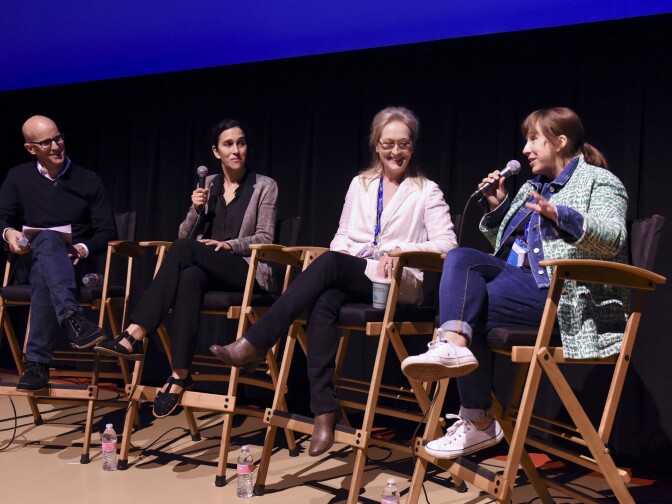'Suffragette' is a period film with modern-day resonance
While the upcoming movie "Suffragette" is set firmly in the past, in many ways it still feels incredibly timely.
Starring Carrie Mulligan, Brendan Gleeson and Meryl Streep, the movie — set early in the 20th Century — documents the British women who fought for decades for their right to vote.
After the film’s world premiere at the Telluride Film Festival in early September, screenwriter Abi Morgan and director Sarah Gavron joined us to talk about the hidden history of the Suffragettes, their gradual path towards civil disobedience, and the ways in which their story feels all too timely.
Interview Highlights:
Sarah, was this a story you grew up with, one that you learned in school?
Gavron: I didn't learn it at school, which was kind of astounding 'cause it's such a pivotal, key moment in women's history. But it was later that I started to read about it and I started to realize that this sanitized view we have of women petitioning Parliament and drinking tea was only a tiny portion of the story.
There's this whole, shocking material you can unearth about women who went to prison, who were force-fed, who sacrificed so much in their fight for equality and lost families, jobs, homes, and faced incredibly brutality from the police and the state. And we wanted to tell that untold story that's never been seen on cinema screens.
Abi, as you start researching that untaught story, what shocked you the most about what had happened?
Morgan: Primarily, when we started to read the accounts of the women, it was just how contemporary their situation seemed, the things they talked about — inequality in the workplace, appalling work conditions, domestic violence, sexual abuse in the workplace, inequality in regard to parental rights — and it really chimed with 21st Century preoccupations.
I had watched a lot of "Downton Abbey" and I've done period drama before, and there's always that slight curse of the language in period drama, the language you think you need to write through. But, actually, these women swore, their language was quite rough, and it felt very real — very much like East London.
It wasn't just their language that was rough, but their tactics were rough as well. They had spent decades trying to get the right to vote and they'd made absolutely no progress. So they decided there was a different path to take, a path that included what we'll call domestic terrorism. They threw bricks through windows, they blew up mailboxes and burned down the houses of MPs, right?
Gavron: In a way, it's interesting to look at the context. The word "terrorism" now has such specific associations of targeting human life, and they were very clear that they were only going to attack property. They turned to civil disobedience after 40, almost 50, years of peaceful protest that achieved nothing but endless broken promises by the government.
And also they started being treated terribly badly by the government, and it was at the point that they realized this press blockade — where nothing they did was being reported — was only broken once they started causing mayhem and disrupting society, disrupting communication channels. And suddenly they were being reported and people were noticing the cause.




